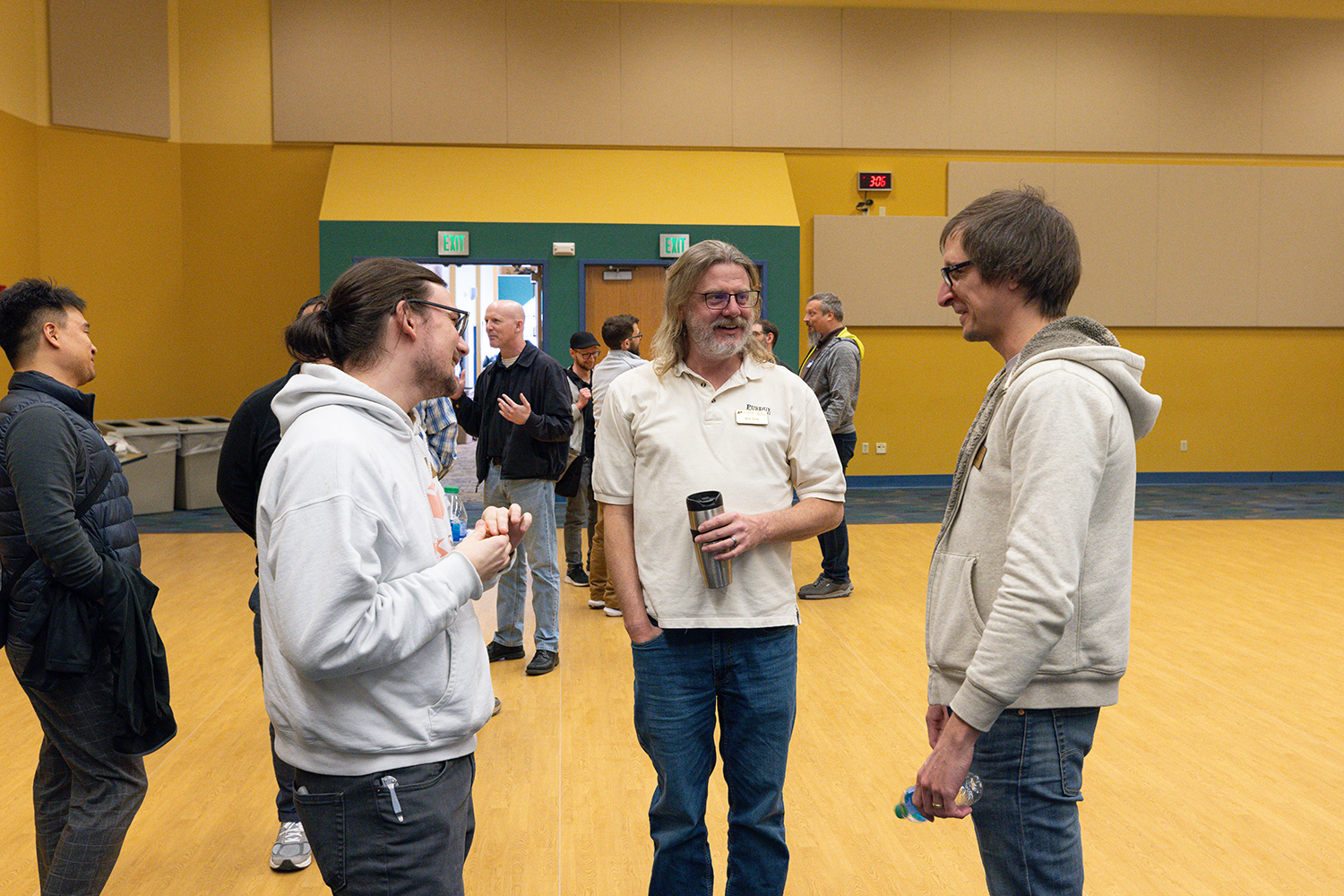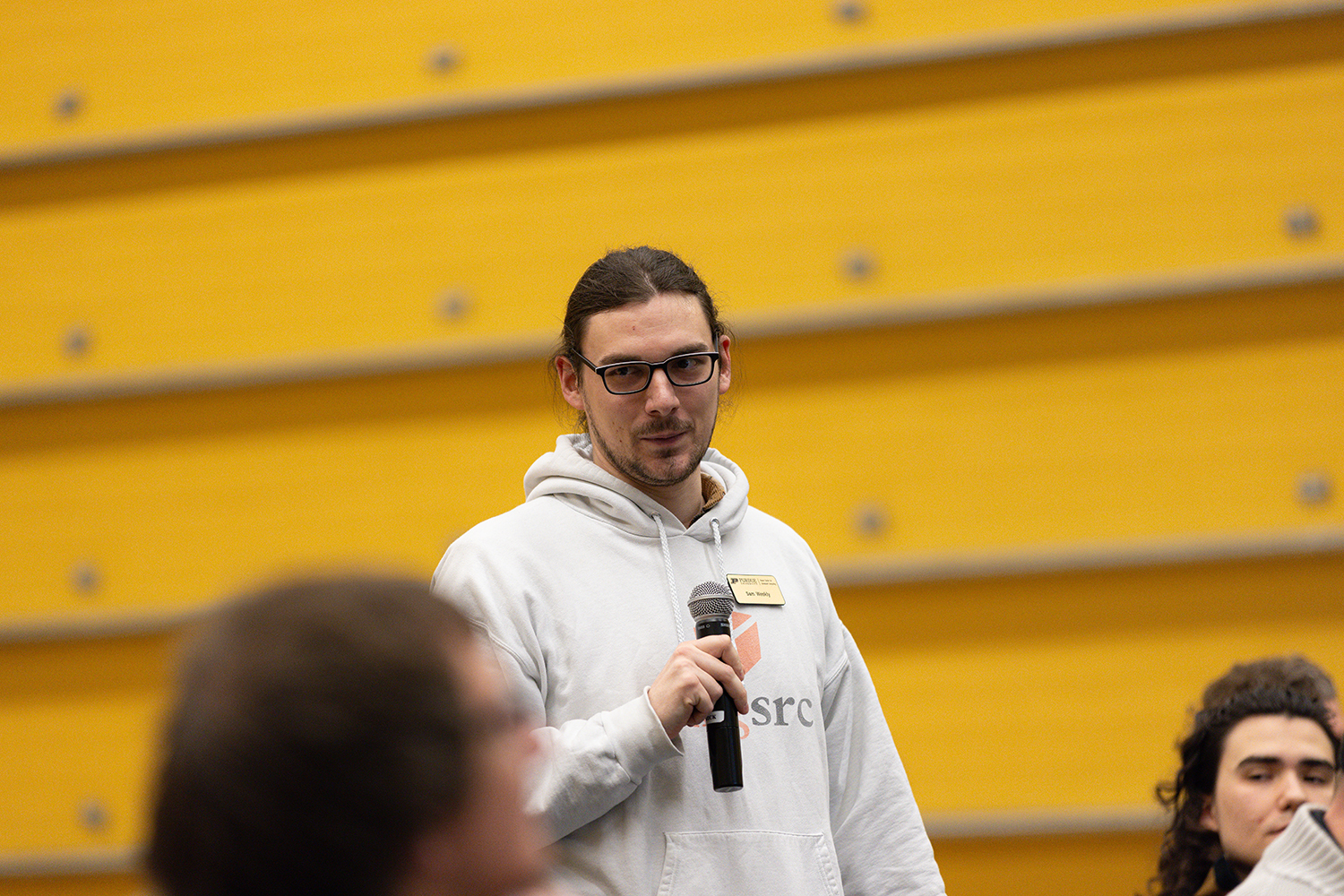News & Events
- There are no upcoming Student Events at this time.
Meet Your Mentor!
We sat down with our 2025 Anvil REU Mentors to discuss their role at RCAC, what their REU students will be working on, and much, much more. Keep reading below to learn more about your mentor.

Sam Weekly
Please introduce yourself
My name is Sam Weekly. I'm a Research Solutions Engineer at RCAC here at Purdue. I help our researchers solve their complex problems by contributing to the design, buildout and operations of the compute and storage systems our researchers leverage for their work. I enjoy tinkering with technology, all aspects of music, and being outdoors.
What do you do?
My job title is Research Solutions Engineer, I help with the design, deployment, and upkeep of our compute, storage, and auxiliary systems that support our researchers at Purdue and more broadly in the United States. I also help troubleshoot and resolve issues that come up in the day to day operations of our systems. I specifically focus on our composable (kubernetes) and storage systems.
Why would I come to you for help?
I have technical expertise related to your problem and have first hand experience working in student operational roles.
What’s one thing you wish you’d known when you started working in HPC?
How connected and friendly the HPC community is and all of the early career support that is available.
What's one professional skill you're currently working on?
Leadership
What's your go-to productivity trick?
For achieving and maintaining high focus work sessions, music and careful scheduling and grouping of tasks. For being stuck on a task, a short walk to reflect on the problem at hand and the best solution to move forward.
What behavior or personality trait do you most attribute your success to, and why?
Curiosity. It takes a lot of dedication and time to keep up with the fast pace of technology advances and determine how we can best utilize those to the maximum benefit of our researchers. Curiosity is a big driver in keeping up with technology and solving problems that often come up in the operation of complex systems like ours.
What was your first job?
Library Page
What’s the worst job you’ve ever had, and what did you learn from it?
Probably my first job as a library page, I learned that I enjoy helping people in my job and I prefer to work in environments that challenge me mentally.
What was your favorite job you’ve ever had and why?
Probably my first job as a library page, I learned that I enjoy helping people in my job and I prefer to work in environments that challenge me mentally.
What’s a mistake you made early on in your career, and what did you learn from it?
One mistake that stands out is when I rebooted the wrong networking switch which resulted in a large amount of computational work being wasted. That really helped illuminate the value of our work as well as the need to slow down and ask for clarification or assistance when you aren’t sure of the steps you need to take to resolve an issue.
What led you to this career?
An affinity for technology, technical experience, student opportunities, guidance from family, friends, and coworkers as well as some luck.
What are you currently excited about in your job?
A new object storage system we will be deploying soon to complement the Anvil Systems.
What’s one thing that surprised you about working at Purdue/RCAC?
The sheer scope and diversity in the types of research that are performed at Purdue.
What’s a work-related accomplishment that you’re really proud of?
The Geddes Composable Platform, a kubernetes powered platform to provide space for persistent workloads as well as ones that are not well geared to the more traditional style of batch HPC compute.
What's the biggest misconception people have about your position?
Since I work on supercomputers, I also know how to fix your windows laptop/desktop.
How long have you been on the Anvil team/at RCAC?
I have been on the RCAC team full time for 4 years, with several years before that as a student employee.
Education, publications, engagement (groups part of), etc...
I have a high school diploma, some college education, many industry technology certificates and lots of skills gained from hands-on job experience and home-labbing. I have published a paper and poster on utilizing cloud bursting in HPC environments and am engaged in several professional groups focused on the research community, composable computing on campuses and various storage technologies and their applications. CaRCC, OpenZFS user group, campus k8s/openshift are the organizations I am involved with.
Fun Fact:
I have a decade of semi-professional audio experience in front of house and audio recording, I also play several instruments.
Why did you decide to become a mentor for the REU program?
I want to help continue our work of providing unique opportunities for people who are just starting or about to begin their professional careers. Being a student employee was a very fulfilling experience for me and I want to ensure opportunities like that remain available for anyone getting a start in this industry.
What value does the REU program provide for students?
REU provides a unique experience to work on problems in a collaborative environment with some of the world's top researchers and technologists.
-
What do you hope the REU gets out of the program?
An opportunity to learn about the exciting world of HPC while working on problems that will improve our operational excellence and deliver solutions that directly benefit our researchers and us.
-
How can this help them in their college career?
Working in a research center at a university is a unique experience to see how research centers at universities operate and can help open new paths that can later benefit you in your research and/or college experience.
-
How can this help them in their professional career?
Skills gained that can be useful later in your professional career, an opportunity to work with professionals in research and IT and form connections that might serve as points of support or collaboration in your career.
What value do you get from being a mentor for the REU program?
I get to practice taking a lead role in a project and provide mentorship to those who are in a similar situation that I was several years ago.
What will your REU students be working on specifically?
We’ll be building a data warehouse and visualization dashboards that drive datacenter operations and management by providing highly tailored monitoring, alerts, and visualizations to the various teams that support and to the users of our research supercomputers and related infrastructure. We’ll be exploring various log and metric sources and how to correlate data from many sources using database technologies to form a comprehensive representation of the datacenter and compute environment at any moment in time. This will set a solid foundation to serve as a central data hub for future work in proactive monitoring, helping us optimize performance and reduce downtime of our systems. Then we’ll be extending the data warehouse to include new sensors to complement our data collection from the datacenter and work to integrate those new metrics into our monitoring systems.
Why HPC?
-
As an industry to work in
HPC provides a unique intersection between research and IT that very few other careers provide. HPC powers many objectives behind national security and fundamental research that helps move humanity forward, so it’s easy to find a place where your contributions are valued and your work contributes towards the common good.
-
As a use for research
Supercomputers are a very cost effective way to improve the speed, size, and accuracy of simulations and other types of computational workloads leading to faster and more accurate results to your pressing research questions than traditional computation can often provide.
-
As an experience as an undergrad
HPC represents a unique cross section of many fields of research and technology. You can see the practical application of specialized technology and gain hands-on experience in a work environment alongside world class technologists and researchers.
Why RCAC/Purdue?
-
As a place to work as a professional
RCAC is a diverse community filled with intelligent and welcoming people eager to collaborate and engage with you on interesting problems and projects.
-
A place to get your education (e.g. grad school)
Purdue is a world renowned R1 Research University with many opportunities for students to engage in interesting research projects and explore their interests.
-
As a place to work as an undergrad
RCAC is a unique opportunity to work on real world problems alongside excellent peers directly supporting advancing research and learning at Purdue University.
Where do you see HPC/Supercomputing/Research Computing going in the next 10 years?
I think the most noticeable changes in HPC will be in supercomputer composition and an increased focus on constructing energy efficient systems. With the increasing use of AI (with its high demand for GPUs), containerized workflows and the meshing of traditional batch HPC and containerized workload management, systems will be more diverse in their design to accommodate new paradigms of workload management.
Storage technology is seeing some of its biggest changes since the large-scale adoption of solid state storage technology. As the paradigm of scheduling workloads changes in HPC, storage will become more broad in the use of various technologies and more focused on the performance and design of storage systems.
Have you ever been an REU or student employee?
Yes, I was a student employee.
-
What was your experience?
Being a student employee was an awesome experience for me. It allowed me to explore a new career path I wasn’t previously aware of while equipping me with the fundamental skills needed to succeed in such a role in the future.
-
What did you learn?
Too many things to list but primarily the fundamentals of system administration and how datacenters and large computational systems are managed and operated.
-
How did this propel you into your current job?
Being a student employee gave me direct hands-on experience and an opportunity to expand and refine my core skills around Linux and HPC storage administration.
What will you do differently as a mentor for students to make the experience better?
Try to provide as many self directed resources as possible to provide assistance on introductory topics and problems to allow students to quickly move through blockers that can come up early in projects.


